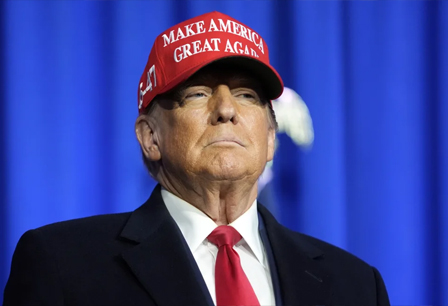President-elect Donald Trump has sent mixed signals for years on whether he would aim to fire or demote Fed Chair Jerome Powell when he reenters the Oval Office next year.
But Powell himself laid down a marker Thursday that he won’t be going anywhere, even if Trump tried.
"Not permitted under the law," the central bank chair said Thursday in curt but clear responses to reporters who asked about his views on any legal authorities Trump might have in terms of firing or demoting him or any other top Fed officials.
"No," he said at another point in a press conference on the question of whether he would leave.
It could be a point of conflict in the months ahead. Trump has signaled he may not be inclined to fire Powell but has also maintained he has that power.
For his part, Trump reiterated the idea of firing Powell in a 2020 news conference when he bluntly said, "I have the right to remove" Powell.
He added that he could also demote Powell from his position as chair, "put him in a regular position, and put somebody else in charge."
It’s an unsettled legal question, though, with many experts falling on Powell's side of the argument.
At issue is Section 10 of the Federal Reserve Act. The law states that each member of the board shall hold office for 14 years "unless sooner removed for cause by the President." The statute doesn't have any language that specifically addresses the chairman of the Board of Governors.
The question that has been debated for years is what exactly constitutes "for cause."
The language in the law is plainly more restrictive for Fed officials when compared with the arrangements of cabinet officials and other members of a presidential administration, who are often described as working "at the pleasure" of the president.
Legal experts have tended to say that a simple policy disagreement wouldn't rise to the level of cause, but it's a standard that hasn't been tested with a judge.
'I’m not going to get into any of the political things'
The comments from Powell and the legal questions come amid massive uncertainty for the central bank following the decisive win for Trump on Tuesday night.
During his first term, then-President Trump attacked Powell with regularity (even though it was Trump who had elevated him to his current role) and openly pushed for the actions he wanted, even once suggesting negative interest rates.
Esther George, the former president of the Kansas City Fed, also weighed in on possible implications of a Trump presidency in a Yahoo Finance interview on Thursday afternoon.
When exit polls began to be released on Tuesday night, it appeared to contain a nugget that augured well for Kamala Harris. In the end, it didn't.
Americans were asked who they trusted more to handle the economy. It was a win for Donald Trump — 51% picked him to 47% for Harris — but it was a much more narrow victory than would have been imaginable earlier this year when the former president was trouncing President Joe Biden regularly on the issue.
It seemed to be a validation of a strategy for Harris in the final few days of the campaign to focus on the economy — which is called the top issue for voters so much it can feel like a cliché — and tout her plans to bring down the prices of things like groceries and housing.
But those results clearly boded nothing of the sort. Trump, in the hours that followed, romped to a decisive victory that saw him win crucial battlegrounds as well as be on track to win the popular vote for the first time in his three runs for office.
"I am so proud of the race we ran and the way we ran it," Harris said Wednesday afternoon as she conceded the race. "We must accept the results of this election."
There are many answers to what caused Trump's win and Harris's loss but one clear factor appears to be a recent decline in Americans (especially Democrats this year at least) who say the economy is their top issue.
In 2012, the exit polls found a whopping 60% of all voters picked the economy as their top issue. This year, the result was barely half that with 31%.
Waning interest in the economy
In addition to this overall decline in voter focus on the economy, this year's batch of exit poll data found that, for the first time in years, the economy did not rank as the top Election Day issue. Voters narrowly ranked democracy as their top issue.
The results were even more striking among Harris supporters. The economy was fourth in that group with Democrats also more attuned to abortion and foreign policy, in addition to democracy.
This downplaying of economic issues was also seen in another measure of voter preferences: the AP Votecast, a survey of more than 115,000 voters nationwide.
It also found vastly different motivations among voters, with the voters who actually pulled the lever for Harris looking at other issues first.
The survey found democracy appeared to be a primary driver for Vice President Harris’s supporters, while Trump’s supporters focused on immigration and inflation.
The economy was the top issue, at 39%, but with many more choices presented, less than 4 in 10 voters answered the economy was the top issue — mirroring the exit polls in that respect.
And Tuesday night exit poll results found that, while Harris did gain when it came to voters' trust on the economy, it did little to help her with those who consider the economy their topic issue.
That 31% of voters who picked the economy as their top issue broke decisively for Trump, 79% to 20%.
Lee Carter, president of Maslansky + Partners, said Wednesday in a Yahoo Finance appearance that the twin issues of inflation and immigration "sealed the deal" for Trump.
"People feel really really negatively about the economy," she noted.
It was also a question that the Financial Times polled in recent months, asking about voter perceptions of trust in the candidates on the economy. Harris was ahead at the time, but Donald Trump took the lead in the outlet's final poll.
Ben Werschkul is Washington correspondent for Yahoo Finance.
Every Friday, Yahoo Finance's Rachelle Akuffo, Rick Newman, and Ben Werschkul bring you a unique look at how US policy and government affect your bottom line on Capitol Gains. Watch or listen to Capitol Gains on Apple Podcasts, Spotify, or wherever you find your favorite podcasts.












